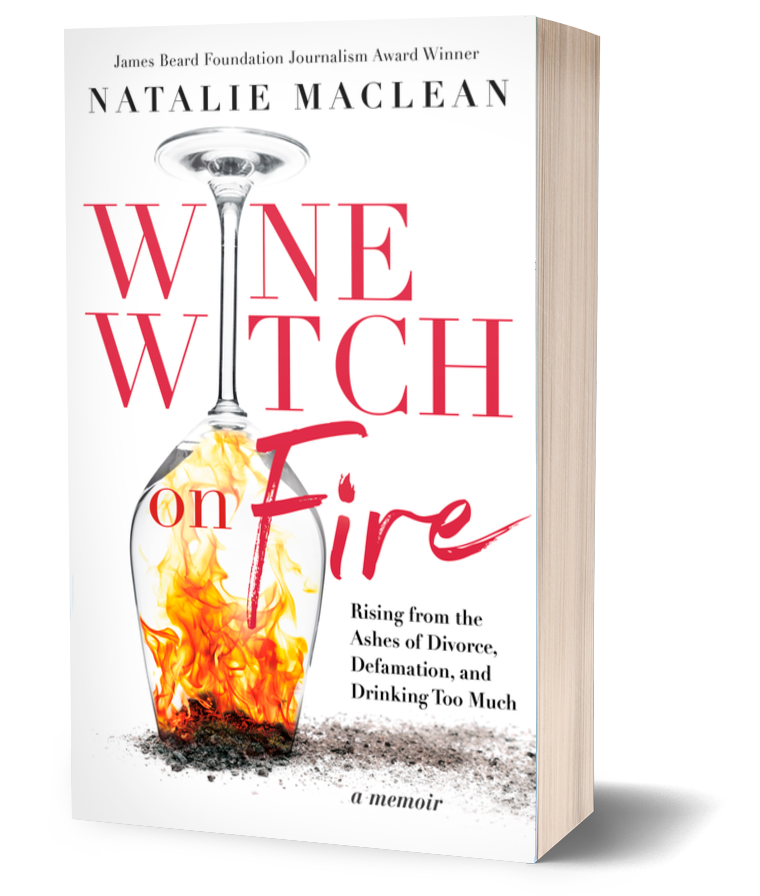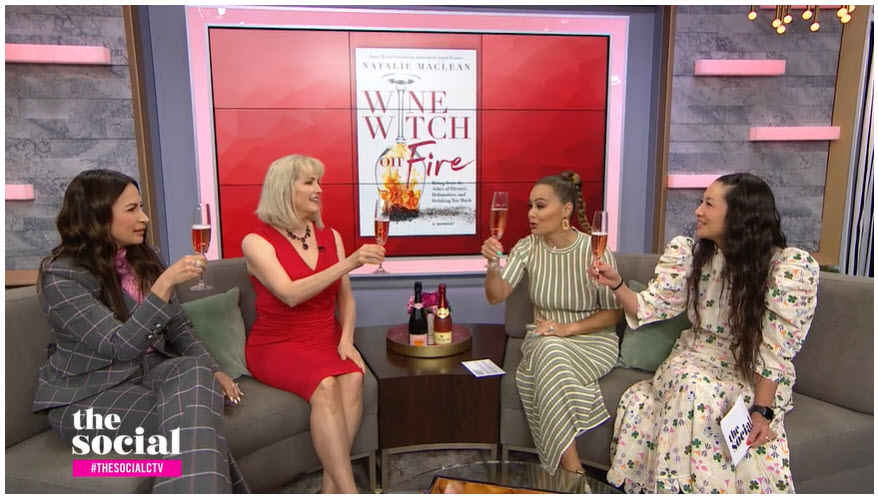
Editor’s Note: You’ll find more media coverage for the book here.
Our next guest as The Social’s resident wine expert but today she’s here in a different capacity, as an author!
Her deeply personal memoir “Wine Witch on Fire” is about divorce, defamation, and drinking too much. Please join us in welcoming Natalie MacLean back to the show!
Nat, we want to start with a toast to say congratulations on the book! We’ve all got a little bubbly, mine is non-alcoholic, so let’s do a cheers to you!
Thank you so much, it’s great to be here!
“Wine Witch on Fire” feels like such a fitting title for your memoir! The witch theme is threaded throughout the book so what is it about witches that resonates so strongly with you?
Witches resonate with me because their strength comes from within, not from external validation. They also embody the unity of women, the power of the feminine, and the healing connection to nature. My favourite childhood stories were always about witches, both good and bad, especially The Wizard of Oz and battling duo of Glinda the Good Witch and the Wicked Witch of the West who was unnamed in the book. I was entranced with these opposing forces that I later realized were inside me.
Now, of course, I realize how damaging stereotypes of women can be, and I think it’s time to reclaim the word witch and what it means: a wise woman who’s been through the fire and knows the measure of her powers.
The story of the book focuses on a certain period of your life but the timing isn’t linear, you jump around a bit. Tell us about the inciting incident you chose to start with and what the fallout from it was?
This was just before Christmas and I was checking my email one last time before heading upstairs to bed when a Google alert pops up with the headline: Natalie MacLean: World’s Best Wine Writer or Content Thief?
I clicked through to a large American wine and spirits website. There was a long rant about me with phrases that burned into my retinas. This wasn’t simply a nasty post. I was being accused of the one thing a writer dreads most. Doctors lose their license for malpractice; lawyers are disbarred for misrepresentation; writers get their careers cancelled for copyright issues.
The accusation was not about plagiarism, but rather about fair use in quoting another review to provide more context about a wine as Rotten Tomatoes does for a movie. Many people confuse these concepts, but there’s a huge difference.
I was the first to comment on the blog post. I explained that I was already changing the way I quoted other reviews as it wasn’t something that was noted in the post, nor did they contact me to ask about it, though they did contact a wide range of other wine writers for comment. I naively thought this would answer their concerns and that would be that. Oh. So. Wrong.
Their accusation ignited a debate online, but the bonfire escalated when the trolls then focus their attack on me as a woman. It devolved into taking my body apart piece by piece in public and this spreads to other websites and newspapers around the world. Some would say, just ignore it, but when you earn most of your living online, you can no more just turn it off than a surgeon can operate outside the hospital.
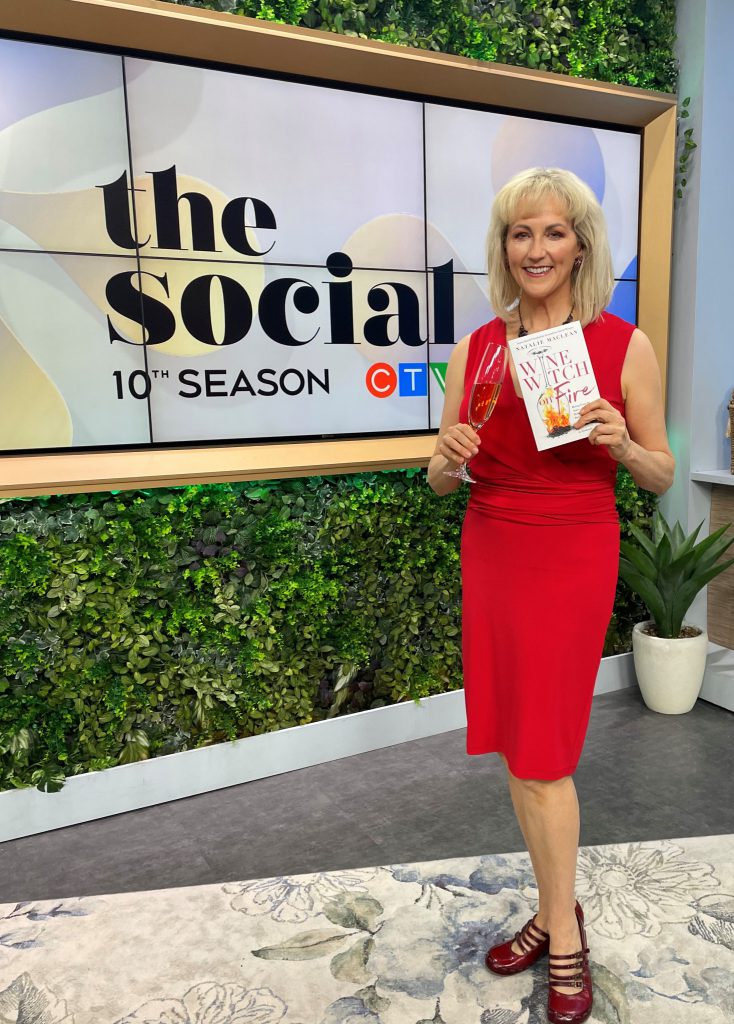
You talk about the online defamation and your divorce when your husband of 20 years left seemingly out of nowhere. As a wine professional in the public eye, why did you choose to share such personal details about your life?
At first, I thought, just walk away this dumpster fire and forget it. It was too painful to even look at my journal notes during that year. To write about it publicly would vandalizing my own privacy. So that’s what I did for five years. But the story ricocheted around my head all that time, and I finally realized I had to let it out, at least on paper.
For the first year I spent writing this story, I had no intention of publishing it. It was a private exercise in making sense of what happened to me.
I realized, though, that keeping this story to myself was a way of not connecting fully with others, like I had done with my mother, partner and son. My life had great curb appeal because I had kept all my imperfections hidden.
However, openness is the way to live a full, rich life. Vulnerability in this story opens a door and invites people inside my life to show them the cracks that they might recognize in their own lives.
Little Miss Perfect can’t control what others think of her, only what she tells them. So why not tell them lots, without editing out the nasty bits? That’s how I connect with others — not through perfection but through sharing my flawsome tendencies, which they see in themselves.
Rotkäppchen De-Alcoholised Sparkling Rosé
Germany
You also share that you felt like you were drinking too much. What made you realize you were over-consuming and how did you start moderating your alcohol consumption?
I drank too much in response to my divorce and online bullying, but also about my issues with hyper-
competitiveness and perfectionism. The challenge was making it through the arsenic hour around 5:00 p.m. when there’s a natural dip in serotonin, the hormone that stabilizes our mood and sense of well-being. When I worried about how much I was drinking, I’d have another glass to calm my anxiety. Wine blanketed my screaming thoughts about the future.
This is a topic we don’t talk about in my industry. Drinking is viewed as an occupational duty or there’s shame in admitting a problem. U.S. Department of Health and Human Services statistics indicate that the hospitality industry, which includes wineries and restaurants, has the highest rate of substance abuse among all professions.
Now when I open a bottle, I’ll pour half the wine into a clean, empty half bottle and recork it. It keeps the wine fresh for another night, and I’m more mindful about how much I’ve consumed. I ask myself what was the thought before the thought, “I need a glass of wine.” If it’s about relieving stress and not enjoyment, then I try to find another way to do that: go for a walk, take a bath, watch a favourite show.
Low and no-alcohol wines are also now part of my repertoire.

You used to work in the tech industry but you left while you were on mat leave to follow your passion and start your career as a wine writer. As we’ve seen on this show over the years, there’s a certain Natalie style and humour we know and love you for. When you started out as a wine writer, did you have trouble being taken seriously with your
different approach to reviews?
My approach was personal, conversational and feminine – also at odds with being taken seriously. Entertain before you educate.
Throughout your memoir, you describe the slick and sexist marketing geared towards women. Can you elaborate on that?
The message on some bottle labels is that women belong in a particular category. We’re vixens drawn to brands like Little Black Dress and Stiletto with their labels featuring short dresses, high heels, and red lips. Or we’re exhausted mothers buying wines such as Mommy Juice and Mommy’s Time Out to obliviate the stress of motherhood.
If we’re not babes, we’re battle-axes reaching for wine labels such as Mad Housewife, with taglines like “Award thyself,” “The dishes can wait,” and “Dinner be damned.” It seems to me that antiquated societal beliefs about women have been turned into slogans.
The marketing message is that women need to have a reason to drink, whether it’s girls’ night, a fancy
occasion, or just getting through another day of exhaustion. It’s implied that we need permission to drink, as we do when we buy things. There’s even a wine for sneaky shopping called White Lie, with little lines stamped on the corks like “This old thing?” and “I got it on sale.”
We’re wallets, not women. We drink cutesy, crappy wines that subsidize the good stuff men drink. Conversely, wine is marketed to men as sophisticated and artisanal. No one asks a man why he wants a drink. He has one because he wants one.
Veuve Clicquot Brut Rosé Champagne
Champagne A.C., France
You now recognize your culpability in promoting the gendered wine messaging in your writing. What were you doing then and how have you changed your approach?
Wines were described as either feminine (light-bodied, smooth, supple, easy-drinking) or masculine (full-bodied, muscular, complex). Even the assumption that feminine means something lighter than masculine is problematic. While chardonnay has often been described as blowsy or slutty, I’ve never seen those same descriptors for a full-bodied red wine, like cabernet or shiraz.
As much as these sexist tasting notes repulsed me, they made me think of my role in promoting gendered wine messages to women and to myself. Was I part of the industry’s marketing machine frequently touting the statistics about how important women are to the wine industry without talking much about the dangers?
My culpability in these narratives has now become clear to me, but back then I couldn’t see it. It’s hard to read the label from inside the bottle.
I wasn’t a bystander in the labelling game. I was team captain. In magazine articles, I had often described my glass of wine at 5:00 p.m. as “Mommy’s little helper.” That’s how I marketed wine to myself. It was also my way of fitting in with other “wine moms.” It sounded lighthearted, but it had the bitter edge of resentment. By that time of the day, I was exhausted. No one was helping Mommy, so Mommy helped herself — to a drink.
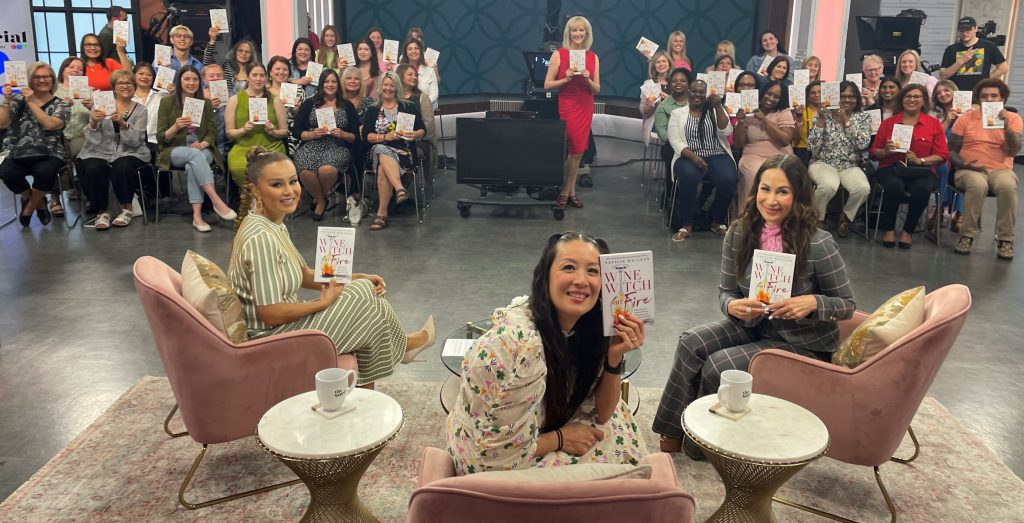
One of the reasons you left the tech industry was because of the blatant misogyny you experienced. Is the wine world similar?
More than 80 percent of U.S. and Canadian wineries are tiny, producing less than five thousand cases a year and with fewer than twenty employees, according to industry statistics. Most don’t have a human resources department, let alone a harassment policy. Even when there is one, it’s often not communicated to employees.
In the drinks business, like others, the cultural norms are established at the top.
Entry-level winemaking, sommelier, and other positions are apprenticeships with a mentor rather than
conducted via group training. Even candidates with a college or university education must still apprentice.
They’re often young and relying on their boss to refer them to their next position. These close, one-on-one work relationships with great power differentials can easily be manipulated.
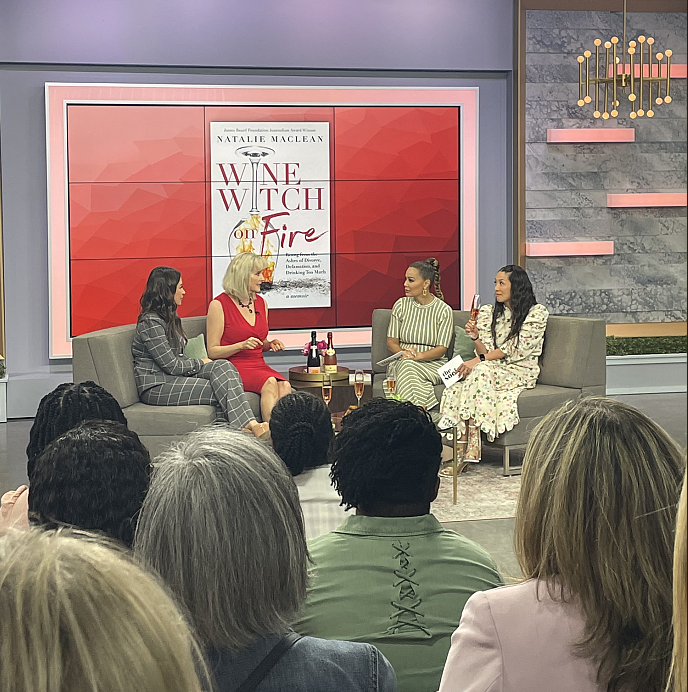
A 2018 survey by the U.K. hospitality industry union. It revealed that 89 percent of hospitality workers and 80 percent of female agricultural workers reported on-the-job sexual harassment, statistics that don’t even include other forms of power abuse.
Sexual misconduct is not about sex and not a mere misbehaviour: “It’s about using your gender to undermine, intimidate, and put someone in their place. It’s about abusing your power to render someone else powerless.”
In 2020, the New York Times published Julia Moskin’s scathing, multi-page exposé of the wine industry’s rampant sexism, with twenty-one women reporting that they had been sexually harassed, manipulated, or assaulted by male Master Sommeliers. The article noted that the abuse was a continuing problem of which the Court of Master Sommeliers leadership had long been aware. Women who had had relationships with the men were called “sommsuckers.”
The fallout was swift. Seven Master Sommeliers were suspended or stepped down for sexual misconduct, including the chairman of the organization. There were calls for the entire board of directors to resign and to disband “the court.” Many of those interviewed in a series of follow-up Times pieces believed this was only the beginning for the last pale, stale, male preserve now imploding with its own #MeToo revelations.
Natalie, what a pleasure it was to have you here and congratulations again on the book!
Thank you for having me, cheers!
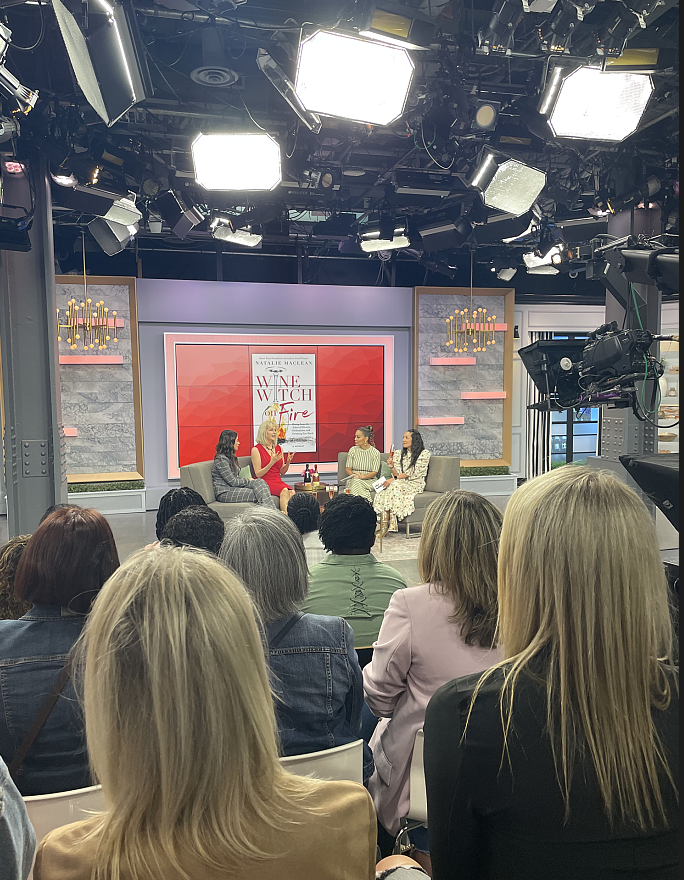
Posted with permission of CTV.


